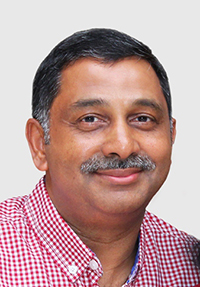Experts in mental health care from across the world will come together at De Montfort University Leicester (DMU) to discuss how to reduce inequality in treating people from different cultures.
In the first international event of its kind, visitors and speakers will pool their skills and experience to tackle the racial and religious stigma and misunderstanding which leads to poor mental health treatment for millions of people across the world.

Professor Raghu Raghavan
The international conference – being held at DMU from June 22-24 - was conceived by Professor Raghu Raghavan, Chair in Mental Health at DMU. He said the three day event was the first of its kind.
He said: “It’s the first time such an international meeting has been held in Leicester and it is something I feel we really need to have.
“In mental health one of the most controversial issues is culture and ethnicity. There is across the world, and in this country, a lot of inequality in the way people from different backgrounds and cultures are treated for mental health.
“African Caribbean people are perhaps worst affected, three to five times more likely than any other group to be diagnosed; being sectioned and admitted to hospital. But it is similar for many people from other minority ethnic communities”
Prof Raghavan explained that around 450 million people worldwide experience mental ill health and one in four families worldwide are likely to have at least one member experiencing mental ill health.
He said: “Attitudes towards conditions vary among people from different cultures, ethnicity and nationalities and are often stigmatised in many cultures, forcing people to live in denial or preventing them from seeking help when required.
“Ethnicity and cultural and religious beliefs affects the perception of mental health, help seeking and service utilisation.”
The idea of the conference is to bring experts from across the world together to share best practice, and also discuss the role of religion, taboo and custom in different regions, exploring how an ethical, consistent approach to mental health care can be adopted across the world.
Visitors will include psychiatrists, psychologists, nurses and social workers, academics and volunteers. Crucially, it will also see patients and carers share their experiences.
Professor Raghavan said: “I believe that this international conference will provide us all with the opportunity to develop new ideas, create an environment for exchange and enrichment and learn from diverse experiences to increase our knowledge to influence mental health policy.
“This will impact on developing transformative practices and service models for all including people from diverse ethnic and cultural communities.”
Posted on Tuesday 14 June 2016